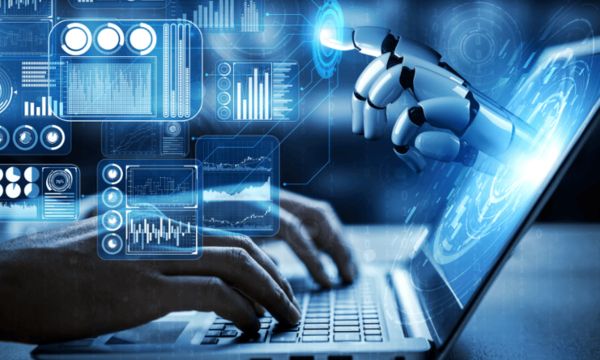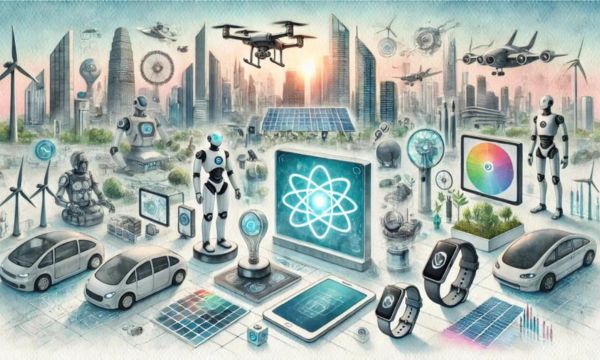8 Ways AI Tech is Changing the Game in Software Development!
Artificial intelligence is rapidly changing the way software is created, creating a new way of working that prioritizes speed, innovation, and accuracy.
Ad
As we move deeper into the digital age, integrating AI technology into software development is no longer an option. This is now a must for those who want to stay competitive and relevant.
We will discuss in detail below how artificial intelligence is changing software development in many different ways.
1. Generating computer codes
The advent of AI-driven automatic code generation is a big deal because it makes it easy for developers to quickly turn natural language requirements into working code. This feature greatly speeds up the development process, making the coder’s work easier and reducing the number of errors that occur when writing code manually.
Some of the first tools in this space are GitHub Copilot and others, which provide ideas and generate code snippets based on the project context. This reduces the time it takes to complete projects and makes people more productive.
2. Intelligent debugging
Debugging is an important part of creating software, but it takes a lot of time. Artificial intelligence enables better debugging by automatically finding bugs, security issues, and bugs in your code. AI algorithms can spot errors that humans might miss by looking at patterns in code and learning from past data.
They can then suggest improvements and solutions. This intelligent approach to debugging improves code quality, reliability, and security, helping software solutions perform well.
3. Use predictive analytics to execute projects
The success of a software project depends on how well it is managed. AI-powered predictive analytics tools are very useful for project management because they look at data from past projects to guess when things will be completed, whether they will be delayed, and what resources will be needed.
These tools can help managers better allocate resources, identify risks in advance, and make informed choices to keep projects on track by giving them a predictive view of their progress.
4. Better user experience design
When it comes to software, user experience (UX) is the key to its functioning. Artificial intelligence plays an important role in improving user experience design as it can analyze a large number of user interactions, preferences, and comments.
Machine learning models can observe user behavior and discover patterns and trends. They can then recommend design changes to make the app more user-friendly and fun. This data-driven approach to user experience design is an important part of creating apps that meet and exceed user expectations.
5. Test automation and quality control
Quality Assurance (QA) is very important to ensure that a software program functions properly and is free of errors. AI automates QA by using machine learning algorithms to run complete test situations that resemble the many different ways a user might behave.
This automation not only speeds up the testing process but also ensures that the software is tested more thoroughly in a wider range of scenarios. This improves the result in terms of quality and reliability.
6. Customized software experience
An important way to stand out in the market is to provide a personalized software experience. Artificial intelligence makes this possible by studying user data in real-time to change how the software works and what it displays.
AI-powered personalization improves user engagement and happiness by customizing the user interface, delivering personalized content, or changing the way an application works. This enables more user-centric software solutions.
7. Security improvements
In an age where online threats are becoming increasingly clever, securing your software is more important than ever. Artificial intelligence technology improves software security by discovering errors and predicting possible attack paths before they occur.
These AI-powered security tools are constantly adding new threat intelligence. This makes them a dynamic and effective defense system, necessary to maintain user trust and protect private data.
8. More efficient development process
The impact of AI goes beyond writing code and testing; it can improve every step of the software development process. AI tools make software development more efficient by automating the work that is done over and over again, allocating resources more efficiently, and making it easier for development teams to communicate with each other.
Artificial intelligence accelerates and improves the quality of software development projects by removing bottlenecks and making it easier for people to collaborate.
Navigating the Future with AI
But as AI continues to improve, using it in software development can help solve problems and create new ways to be creative and come up with new ideas.
Artificial intelligence has the potential to lead to major improvements in software development, which will be a good thing for employees, businesses, and end users.
On the other hand, the path to using artificial intelligence in software creation is not easy. Things to consider include ethical issues, the need for continuous learning, and concerns about data safety and security.
Furthermore, as AI tools become smarter, it becomes even more important that people pay attention to them and ensure they use AI responsibly.

AI Tech is Changing the Game in Software (Source – Google)
Conclusion
Artificial intelligence (AI) has a huge impact on software development, as it opens up new ways to increase speed, encourage innovation, and create better software products. As we look forward to the possibilities of artificial intelligence, it is important to be careful about how we use it, taking into account its strengths and weaknesses.
We can use AI in this way to open up new possibilities in software development, leading to a future where technology and human imagination come together to create revolutionary solutions.
FAQs
1. How does the planned code creation work?
AI-powered tools can understand natural language directions or specifications and convert them into functional programming code for automatic code generation.
These tools use machine learning models learned on massive codebases to generate accurate and useful code snippets, significantly speeding up the development process.
2. What are the benefits of smart debugging?
Smart debugging using artificial intelligence can help you quickly identify bugs, strange behavior, and potential security holes in your code.
It helps developers spend less time on debugging, write better code, and ensure their software is more secure and reliable by providing the best fixes and workarounds.
3. How does artificial intelligence improve user experience (UX) design?
Artificial intelligence improves user experience design by looking at user data and comments to find trends and trouble spots.
It can then recommend design changes or make the user experience more relevant for each user. This makes the software more user-friendly, interesting, and responsive to the user’s needs.
4. What is predictive analytics in the context of project management?
Predictive analytics is a form of project management that uses artificial intelligence to look at old project data and spot trends. It predicts project timelines, potential bottlenecks, resource requirements, and risks.
This helps project managers make informed choices and ensure projects are completed on time and within budget.
5. Can Artificial Intelligence Completely Replace Human Software Testers?
While AI can simplify and improve many parts of software quality assurance by running complex test scenarios and finding bugs faster, it cannot completely replace human testers.
Understanding situations, making complex decisions, and coming up with creative test cases that AI may not be able to guess are still very important tasks for humans to complete.
 AI in Content Creation: Unlocking a New Era of Productivity
AI in Content Creation: Unlocking a New Era of Productivity
AI in content creation is revolutionizing the way the media world produces, distributes, and consumes information. Ad […]
More The Ultimate Guide to Understanding AI Tech in Agriculture
The Ultimate Guide to Understanding AI Tech in Agriculture
Artificial intelligence (AI) technology is transforming the agricultural sector, making agriculture more efficient, sustainable, and successful in […]
More 10 Breakthrough AI Tech Innovations That Will Define 2025!
10 Breakthrough AI Tech Innovations That Will Define 2025!
As we enter 2025, artificial intelligence (AI) continues to be at the forefront of technological advancements, bringing […]
More